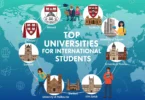How to Fund Your Study Abroad Journey: Expert Guide for International Students
Studying abroad is a dream for many students, but financing this journey often feels like the biggest challenge. As an experienced study abroad consultant with over 15 years of guiding students, I’ve seen countless students overcome financial obstacles by strategically planning funding options. Choosing the right funding options can make the difference between struggling financially and focusing fully on academic and career growth.
In this comprehensive guide, I’ll break down every method to fund your international education, including scholarships, grants, part-time work, and financial planning strategies. By the end, you’ll know exactly how to fund your study abroad journey efficiently.
Why Funding Matters
International education often comes with higher tuition and living costs compared to studying locally. Funding is critical because:
- Reduces Financial Stress: With proper funding, you can focus on learning and personal growth rather than worrying about bills.
- Allows Better Program Choices: Financial freedom gives you access to high-quality programs, internships, and networking opportunities.
- Supports a Balanced Lifestyle: Adequate funding ensures you can participate in cultural, professional, and social activities abroad, which are crucial for career development.
According to recent surveys, students with structured financial plans are more likely to complete their programs successfully and leverage opportunities for internships, research, and networking.
Key Funding Options for Studying Abroad
1. Scholarships and Grants
Scholarships and grants are the most attractive funding options because they do not require repayment. They are offered by universities, governments, and private organizations.
University Scholarships
Most universities provide merit-based or need-based scholarships for international students. Key tips:
- Apply early: Many scholarships have strict deadlines.
- Maintain high academic performance: Scholarships often consider grades, test scores, and extracurricular involvement.
- Highlight achievements: Leadership, volunteer work, and international exposure can increase your chances.
Government-Funded Scholarships
Many countries support international education through prestigious scholarships:
- Fulbright (USA): Covers tuition, living costs, and travel for top students.
- Chevening (UK): Offers full scholarships for leadership potential and academic excellence.
- Erasmus+ (Europe): Supports students studying in multiple European countries.
Private and NGO Scholarships
Many foundations, companies, and NGOs offer funding opportunities. For example:
- Rotary Foundation Global Scholarships
- Gates Millennium Scholars Program
- Local foundations in your home country targeting international study
These scholarships often consider leadership potential, social impact, or specific study areas.

Part-Time Work Abroad
2. Part-Time Work Abroad
Working while studying can be a great way to supplement your funding:
- Many countries allow international students to work 20–30 hours per week during the academic term.
- Popular part-time jobs include teaching assistance, library support, research roles, or on-campus administrative jobs.
- Some internships are paid and align directly with your career goals, providing both income and experience.
Tips:
- Check your country’s work regulations for international students.
- Balance work and study to ensure academic performance does not suffer.
- Seek jobs that enhance your CV or skill set in your field of study.

Student Loans & Savings and Personal Budgeting
3. Student Loans
While scholarships are ideal, loans may be necessary to cover additional costs:
- Many banks and financial institutions offer student loans specifically for international education.
- Some loans have low-interest rates or deferred repayment options until after graduation.
- Research government-backed loans in your home country; some countries support students studying abroad with favorable loan terms.
Pro Tip: Combine loans with scholarships to minimize debt. For example, secure a partial scholarship and fund the remainder through a low-interest loan.
4. Savings and Personal Budgeting
While scholarships and loans are helpful, personal savings and budgeting play a major role:
- Start planning early: Save regularly before applying for international programs.
- Reduce unnecessary expenses: Prioritize essential costs and plan for tuition, accommodation, and travel.
- Use budgeting tools: Online apps can help track your expenses and ensure you stay within your financial plan.
Creating a Funding Strategy: Consultant’s Advice
Funding your study abroad requires strategic planning. Here’s a step-by-step approach I use with students:
Step 1: Assess Total Costs
- Tuition fees, accommodation, living expenses, travel, insurance, and personal expenses.
Step 2: Research Scholarships & Grants
- Identify scholarships based on academic merit, field of study, or country.
- Apply for multiple opportunities to maximize chances.
Step 3: Explore Part-Time Work & Internships
- Consider part-time roles that also enhance career skills.
- Look for paid internships aligned with your academic program.
Step 4: Explore Loans & Sponsorships
- Calculate how much funding you need from loans.
- Approach potential sponsors or employers early.
Step 5: Build a Savings Plan
- Begin early, even small savings add up over months or years.
- Combine personal savings with scholarships and part-time income for a comprehensive plan.
Step 6: Maintain Financial Flexibility
- Keep emergency funds available.
- Avoid over-reliance on any single funding source.

Common Mistakes Students Make
Common Mistakes Students Make
- Relying on a single scholarship: Scholarships are competitive; having multiple funding sources is safer.
- Ignoring living costs: Tuition is just one part; living, food, and travel costs can exceed expectations.
- Late applications: Scholarship deadlines often close months before the academic term.
- Not considering ROI: Some programs are expensive but provide higher career returns. Balance costs with potential career outcomes.
- Overworking: Part-time work is helpful, but overworking can affect academics and wellbeing.
Real-Life Examples: How Students Successfully Funded Their Study Abroad
- Ravi from India: Combined an Erasmus+ scholarship with a part-time research assistant role in Germany. Managed to cover tuition and living expenses fully while gaining practical experience.
- Amina from Nigeria: Received a Chevening scholarship to study an MBA in the UK. Supplemented her budget with part-time work in a student union role.
- Li Wei from China: Saved 20% of her salary, secured a university merit scholarship, and took a short-term loan to study Engineering in Canada. Graduated debt-free within three years post-graduation through a combination of scholarships and work.
These examples show that a strategic mix of funding options is the key to successfully financing your study abroad.
Final Thoughts: Funding Your International Education Successfully
Funding your study abroad journey doesn’t have to be overwhelming. By combining scholarships, part-time work, loans, and savings, you can make your dream of studying abroad a reality without compromising your academic performance or lifestyle.
As a consultant, my advice is:
- Plan early: Start your funding search at least 12–18 months before departure.
- Apply widely: Don’t limit yourself to one funding source.
- Balance work and study: Prioritize your education while seeking practical experience through internships.
- Seek professional guidance: Experienced advisers can help identify unique scholarships and funding opportunities specific to your field and destination.
A well-funded study abroad experience not only provides financial security but also enhances career prospects, professional growth, and global exposure. With proper planning, you can focus on learning, networking, and building a strong foundation for your international career.









